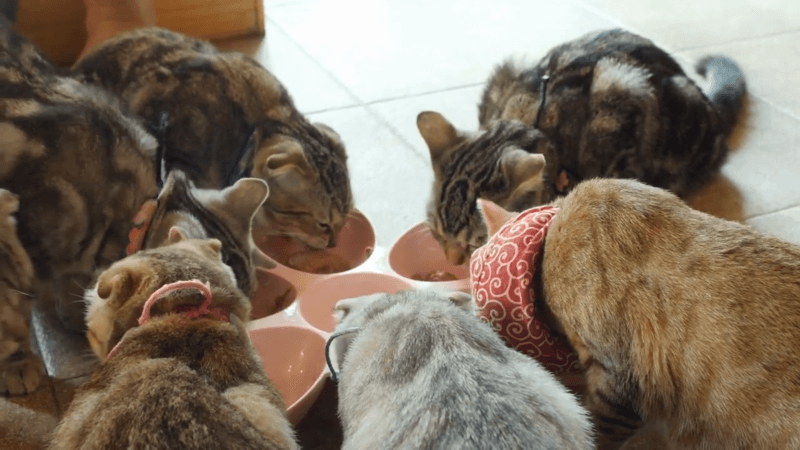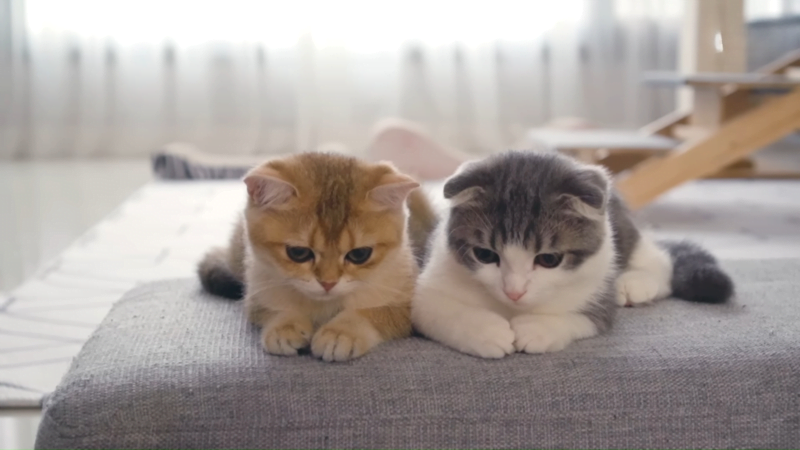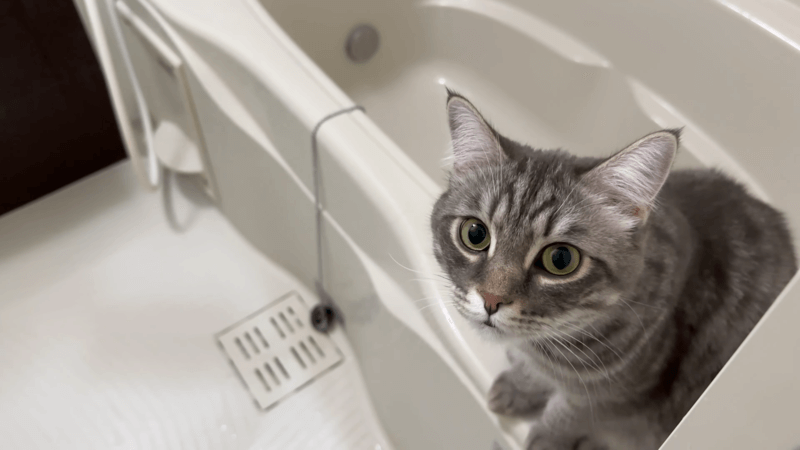No products in the cart.
If you’re seeking guidance on how to take CBD oil for cat depression and enhance your feline companion’s emotional well-being, you’re in the right place. In this comprehensive blog, we’ll provide you with a step-by-step approach to effectively administering CBD oil to your cat while ensuring their safety and comfort, its potential benefits, recognizing signs of cat depression, distinguishing it from other health issues, and the importance of early detection. Furthermore, we’ll explore when to seek professional help and some natural remedies to complement your cat’s emotional care.
What Are the Signs of Cat Depression?
Cats, like humans, can experience feelings of depression. If you suspect your cat might be depressed, here are some signs to look out for:
- Changes in Appetite: A noticeable decrease or increase in your cat’s appetite can be a sign of depression. They may either lose interest in their food completely or start overeating.
- Sleep Disturbances: Depressed cats often experience changes in their sleeping patterns. They might sleep excessively or struggle to fall asleep, exhibiting restlessness during the night.
- Lack of Interest in Activities: Cats usually enjoy playing and engaging in various activities. However, a depressed cat may lose interest and stop participating in activities they once found enjoyable.
- Withdrawal and Isolation: Depressed cats tend to withdraw from social interactions. They may hide more frequently, seek solitude, and avoid any form of interaction, including with their owners.
- Reduced Grooming: Cats are known for their grooming habits. However, a depressed cat may neglect its grooming routine, leading to a lack of cleanliness and a decline in overall appearance.
- Increased Aggression or Irritability: Cats with depression may display sudden aggression towards other pets or even their owners. They may become easily irritated, displaying unusual behavior such as hissing or growling.
- Vocal Changes: Cats suffering from depression might undergo changes in their vocalizations. They may become unusually quiet and show a significant decrease in meowing or become excessively vocal without an apparent cause.
- Lethargy: A depressed cat may exhibit a lack of energy or motivation. They might become less active, spending prolonged periods sleeping or lying around with no interest in their surroundings.
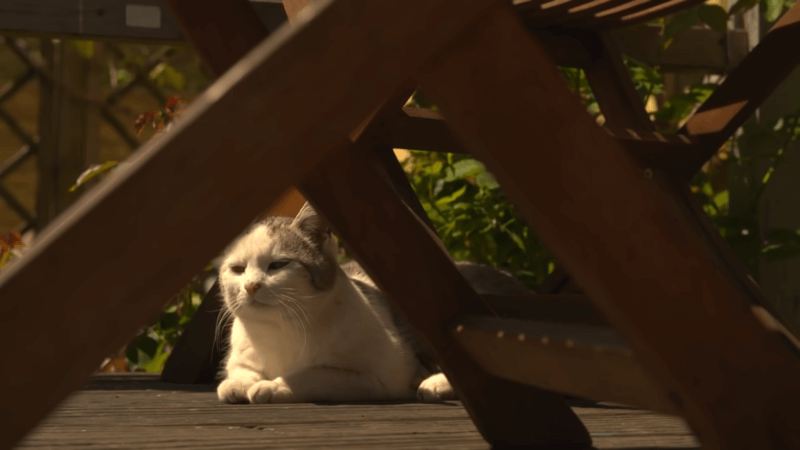
Signs of Depression in Older Cats
In older cats, signs of depression may overlap with general age-related changes. Signs of depression in older cats can include:
- Increased Sleep: While some increased sleep is typical in older cats, excessive lethargy or a dramatic change in sleep patterns can be a sign of depression.
- Reduced Mobility: Older cats may already have decreased mobility due to age-related conditions like arthritis, but depression can further reduce their interest in moving around.
- Loss of Interest in Food: Senior cats may already have diminished appetites, but if there is a sudden and significant loss of interest in food, it could be a sign of depression.
- Withdrawal from Activities: Older cats may become more withdrawn with age, but if they stop participating in any activities altogether, it can be concerning.
- Increased Vocalization: Excessive vocalization can indicate distress in older cats, especially if it’s coupled with other signs of depression.
- Health Conditions: Depression can exacerbate age-related health conditions in senior cats, leading to further physical decline.
Distinguishing Cat Depression from Other Health Issues
Distinguishing cat depression from other health issues can be challenging due to overlapping symptoms. To differentiate between depression and medical conditions:
- Veterinary Evaluation: Always start with a veterinary examination. A veterinarian can perform a comprehensive physical assessment and conduct tests to rule out underlying medical problems.
- Behavioral History: Provide your vet with a detailed behavioral history, including any recent changes in your cat’s environment, routine, or social interactions.
- Physical Symptoms: Monitor for any physical symptoms such as changes in eating, drinking, urination, defecation, or grooming habits, which can be clues to underlying medical problems.
- Onset and Duration: Discuss when you first noticed behavioral changes and how long they’ve persisted. Depression often follows a significant change or stressor.
- Response to Comfort: Observe how your cat responds to familiar and comforting interactions. If they positively respond to these interactions and their symptoms improve, it may suggest a behavioral issue like depression.
The Importance of Early Detection
Early detection of cat depression is crucial for several reasons:
- Improved Well-Being: Identifying depression in its early stages allows for timely intervention, potentially leading to faster improvement in your cat’s overall well-being.
- Prevention of Complications: Untreated depression can lead to secondary health issues or exacerbate existing ones. Early detection can help prevent these complications.
- Effective Treatment: Early detection enables you to start appropriate treatment promptly. Behavioral interventions, changes in the environment, or, in some cases, medication can be more effective when started early.
- Enhanced Quality of Life: Addressing depression early can lead to a better quality of life for your cat. They can enjoy a happier and more fulfilling life with proper care and support.
- Reduction of Stress: Early detection and intervention can reduce the stress and suffering your cat experiences due to depression.
When to Seek Professional Help
Knowing when to seek professional help for your cat is vital to addressing potential issues effectively. You should seek professional help if:
- You Notice Behavioral Changes: If you observe significant and persistent changes in your cat’s behavior, such as decreased activity, withdrawal, or changes in appetite, it’s time to consult a veterinarian.
- Physical Symptoms are Present: When physical symptoms accompany behavioral changes, such as vomiting, diarrhea, weight loss, or excessive grooming, it’s essential to seek veterinary care to rule out underlying medical conditions.
- Behavioral Changes Impact Daily Life: If your cat’s behavioral changes interfere with their daily routines, well-being, or overall quality of life, professional help is warranted.
- Signs of Distress: Signs of distress, such as excessive vocalization, aggressive behavior, or self-harm, require immediate attention from a veterinarian or a veterinary behaviorist.
- Changes in Senior Cats: Older cats may face age-related issues, so any sudden or significant changes in behavior, appetite, or mobility should prompt a vet visit to assess and address potential concerns.
- Unexplained Symptoms Persist: If you’ve tried environmental changes and home interventions to address your cat’s issues, but symptoms persist or worsen, professional help is necessary.
How to Take CBD Oil for Cat Depression
When considering using CBD oil for cat depression, it’s crucial to follow these steps:
- Consult with a Veterinarian: Before administering any CBD product to your cat, consult with your veterinarian. They can help determine if CBD oil is an appropriate option and provide guidance on dosage.
- Choose the Right CBD Product: Select a high-quality CBD oil specifically formulated for pets. Look for products that are THC-free, as THC can be harmful to cats.
- Calculate the Proper Dosage: Dosage recommendations vary based on your cat’s weight and the concentration of CBD in the oil. Your veterinarian can assist in calculating the correct dosage.
- Start with a Low Dose: Begin with a low dose and closely monitor your cat’s behavior and mood. It’s essential to watch for any adverse reactions or improvements.
- Administer the Oil: CBD oil can be mixed with your cat’s food or applied directly to their mouth. Ensure that your cat consumes the entire dose.
- Monitor and Adjust: Observe your cat’s response over time. If needed, gradually increase the dosage while continuing to monitor their behavior. Be patient, as it may take some time to see noticeable changes.
- Regular Vet Checkups: Maintain regular checkups with your veterinarian to assess your cat’s progress and discuss any necessary adjustments to the treatment plan.
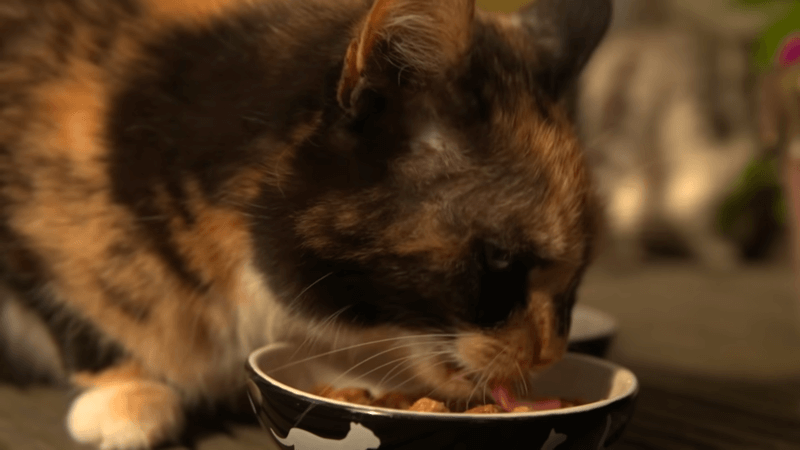
What Is CBD Oil?
CBD, or cannabidiol, is a naturally occurring compound found in the cannabis plant. CBD oil is a product derived from the extraction of CBD from the plant. It is important to note that CBD oil can be sourced from hemp or marijuana plants, with hemp-based CBD containing very low levels of THC (tetrahydrocannabinol), the psychoactive compound responsible for the “high” associated with marijuana.
Key Points About CBD Oil
- Non-Psychoactive: CBD does not produce the intoxicating effects associated with THC, making it safe for both humans and pets.
- Legal Status: Hemp-derived CBD oil with less than 0.3% THC is legal in many parts of the world, but the legal status can vary by region.
- Potential Health Benefits: CBD has been studied for its potential therapeutic benefits, including anti-anxiety, anti-inflammatory, and pain-relieving properties.
- Research Continues: While there’s promising research on the benefits of CBD, more studies are needed to fully understand its effects and potential uses in both humans and animals.
- CBD for Pets: CBD oil for pets, including cats, is specially formulated to ensure it’s safe and suitable for their needs. It’s essential to follow proper dosage guidelines and consult with a veterinarian when using CBD for pets.
Benefits of Taking CBD Oil for Cat Depression
CBD oil is gaining attention as a potential natural remedy for managing cat depression, primarily due to its calming and mood-stabilizing effects. Some potential benefits of using CBD oil for cat depression include:
- Anxiety Reduction: CBD has been reported to reduce anxiety in cats, helping them feel more relaxed and less stressed.
- Mood Enhancement: CBD may have mood-enhancing properties, which can help improve a cat’s overall emotional well-being.
- Improved Appetite: Some cats with depression may experience a loss of appetite, and CBD could help stimulate their interest in food.
- Pain Relief: If physical discomfort is contributing to your cat’s depression, CBD’s potential analgesic (pain-relieving) effects may provide relief.
- Non-Psychoactive: CBD does not produce a “high” or intoxication, making it a safe option for cats without adverse psychoactive effects.
- Holistic Approach: CBD oil is often used as part of a holistic approach to cat care, alongside other natural remedies and lifestyle changes.
How to Choose the Right CBD Oil Product for Pets
Selecting the right CBD oil product for cats involves several considerations:
- Source and Quality: Choose a reputable brand that offers high-quality CBD oil specifically designed for pets. Look for products made from organically grown hemp that undergo third-party lab testing to ensure purity and potency.
- THC Content: Ensure the product is THC-free or contains less than 0.3% THC, as higher levels of THC can be harmful to cats.
- Product Type: Decide on the form of CBD oil that suits your cat best. Common options include tinctures, capsules, and treats. Consider your cat’s preferences and ease of administration.
- Dosage Information: The product should provide clear dosage instructions based on your cat’s weight. Consult with your veterinarian to determine the appropriate dosage for your cat’s specific needs.
- Reviews and Reputation: Read customer reviews and consider the reputation of the brand. Positive feedback and recommendations can be valuable indicators of product quality.
- Price: While price shouldn’t be the sole determining factor, consider the cost of the product in relation to its quality and the value it offers for your cat’s well-being.
- Consult with a Veterinarian: Always consult with your veterinarian before starting CBD treatment for your cat. They can offer guidance on product selection and dosage and monitor your cat’s progress.
Natural Remedies for Cat Depression
Natural remedies for cat depression can complement professional guidance and help create a supportive environment. Here are some natural approaches to consider:
- Creating a Stimulating Environment: Provide an enriched environment with interactive toys, scratching posts, and safe outdoor access (if applicable). Novelty and mental stimulation can boost a cat’s mood.
- Interactive Play and Bonding: Spend quality time engaging in interactive play with your cat. Engaging in games and affectionate interactions can improve their mood.
- Maintaining a Consistent Routine: Cats thrive on routine, so establish a regular schedule for feeding, playtime, and sleep. Predictability can reduce stress.
- Balanced Diet and Hydration: Ensure your cat receives a balanced and nutritious diet. Adequate hydration is essential. Consider puzzle feeders to stimulate their minds.
- Herbal Supplements and Aromatherapy: Certain herbs like catnip and valerian can have calming effects on cats. Lavender or chamomile essential oils, used in a safe and diluted manner, can promote relaxation.
- Feliway Pheromone Diffusers: Feliway, a synthetic feline facial pheromone, can create a calming environment. Diffusers are available for home use.
- Thundershirt or Anxiety Wrap: These garments can provide a sense of security and reduce anxiety in some cats.
- Music and White Noise: Calming music designed for cats or white noise machines can create a soothing atmosphere.
- Consultation with a Veterinary Behaviorist: If natural remedies alone aren’t effective, consider consulting with a veterinary behaviorist for personalized guidance and, if needed, prescription medications.
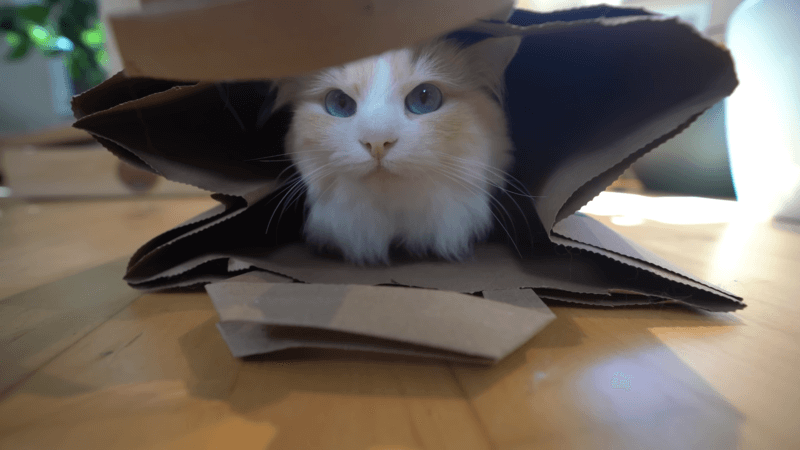
Conclusion
Knowing how to take CBD oil for cat depression and addressing this issue is a vital aspect of pet care. Consulting with a veterinarian for guidance, selecting high-quality products, calculating proper dosages, and closely monitoring your cat’s response are all essential steps. Alongside these considerations, incorporating natural remedies and early detection can significantly contribute to your feline companion’s emotional well-being and overall quality of life. Prioritizing your cat’s mental health with a holistic approach is a loving and responsible way to help them lead a happier and healthier life.
I am Nelson Cooper, I pursue my passion for writing and my belief is that cats love humans. I enjoy traveling and have a deep appreciation for the beauty of nature, as well as a soft spot for animals, particularly cats.

